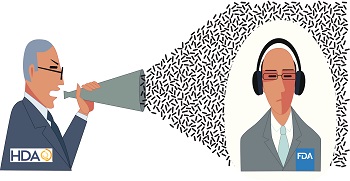
The Healthcare Distribution Alliance (HDA) recently posted their response to the latest draft Drug Supply Chain Security Act (DSCSA) guidance published by the FDA. That draft guidance explains how, when and why companies in the US pharma supply chain can apply for waivers, exemptions and exceptions to provisions in the DSCSA (see “FDA Draft Guidance: How To Apply For A Waiver, Exception or Exemption”). As usual, the HDA took close to the full sixty day comment period to respond. The comment period closed last Monday.
HDA’s public comment submissions to the FDA are always very logical and clear. So much so that I have to believe that the FDA appreciates and actually looks forward to receiving them, even when they contain tough remarks about draft language (see “HDA Urges FDA To Withdraw Draft Guidance ‘In Its Entirety’”, “HDA Urges FDA…Please Re-Read The DSCSA”, “HDA Questions FDA’s Authority To Mandate A Centralized System For the EDDS” and “HDA Schools FDA On DSCSA”). And I enjoy reviewing them here in RxTrace, as you can see. All of this is intended to be helpful to the FDA and the industry at-large. I believe it will result in better final guidance. You can see HDA’s latest comment submission here.
It can sometime seem like the FDA doesn’t hear the comments submitted through the formal submission process (like my goofy little drawing above depicts), but, in fact, I am confident they do. (What they don’t hear are RxTrace essays!) It just takes a long time before the influence of submitted comments can be seen by the public. FDA may immediately agree with some, many or all of the comments submitted by someone, but until the final guidance is published, we can’t really tell it has had that effect. All we can do is wait and watch for the final guidance.
This HDA response doesn’t contain the fireworks of previous responses, but it is still important. HDA included ten major commentaries with the following titles (HDA chose to abbreviate “Waivers, Exemptions and Exceptions” as “WEE”):
- Submissions for CBER-regulated Products
- Content of WEE Request
- Acknowledgement
- FDA Review of Requests
- Standard of Review
- Biennial Review of Waivers, Exceptions and Exemptions
- When considering a WEE, FDA should determine how that WEE (if granted) may affect the supply chain’s ability to comply with related DSCSA requirements
- Notification and publication of a WEE decision
- Lack of timeframes
- Burden Estimate
In my view, the most important comment is number 7. HDA provided several examples of how certain WEEs could cause significant compliance hardship to downstream trading partners if a “partial” WEE were granted. One of them is:
“Product Tracing: If FDA were to grant a WEE relieving a party from the requirement to provide transaction data, FDA would need to consider carefully whether subsequent trading partners would be able to provide compliant transaction data as the product moves through the supply chain; in particular, TH (prior to 2023) and TS provided in a subsequent transaction might be adversely affected. We believe the Agency should make clear that if one trading partner receives a WEE relieving it from certain tracing requirements for a product transaction, subsequent trading partners also should be relieved from the same affected tracing requirements involving that product. Such clarity would be important for supply chain members and for FDA and state officials charged with enforcing the law.”
HDA sums it up with the general proposition:
“HDA believes that an individual product [should be] either ‘all in’ or ‘all out.’ That is, a product should either be fully compliant with the DSCSA product identifier and transaction data requirements, or it should be completely excluded.”
Smart. Under number 8, HDA explains why it is important for notifications of WEEs granted by the FDA be sent to all trading partners:
“This will be especially important when FDA has excepted a manufacturer or repackager from product identifier requirements pursuant to § 582(a)(3)(A)(ii). HDA’s wholesale distributor members have found that manufacturers and repackagers have been inconsistent in their communication of WEEs. An explicit instruction in the Final Guidance that the requester is obligated to inform trading partners of an FDA-granted WEE would aid in standardizing this process.”
I’m not going to call out anything else in the response but don’t take that as an indication that the other comments are not important or interesting. I strongly encourage you to read their entire response so you can fully understand their thinking.
PILOTS?
Back on April 30, 2018 HDA also submitted comments to the FDA in response to the reopening of the comment period for Pharmaceutical Distribution Supply Chain Pilot Projects. The section headings include:
- Prior and current pilot activities
- Future pilots
- Additional remarks and recommendations
I was a little surprised that the word “blockchain” doesn’t appear anywhere in the HDA’s comments, particularly when talking about current and future pilots, considering the activity that I am just casually aware of (see these RxTrace essays). In fact, one of the major wholesale distributor members of HDA is among the biggest proponents of blockchain for DSCSA (see this recent LinkedIn posting for example). It’s hard to deny the potential of blockchain for solving any number of compliance problems the industry is facing under the DSCSA, but by not mentioning something about piloting it, HDA seems to be doing just that. Blockchain should be a strong contender for piloting, so we can better understand whether the potential is just hype, or something real.
I’m not sure what’s going on here, but I hope their support of point-to-point exchange of DSCSA transaction data doesn’t blind them to the potential value of the technology for solving other problems (see “Blockchain Will Not Be Used For DSCSA Data Exchange”). In my view, blockchain should be at the top of everyone’s list when considering what to pilot for any DSCSA data problem.
See HDA’s comments on piloting here.
Dirk.
